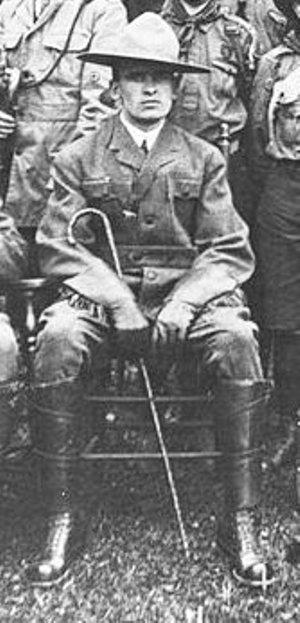BX August 7, 1914
Going Back To Fight – Scoutmaster Was Given Send-Off by Townsmen
PARIS, Aug. 7 – Paris citizens turned out on masse last night to bid bon voyage to Scoutmaster Alfred F. Scott, who is returning to the Old Country to fight his country’s battles. At 7.15 a parade, headed by the Citizens had formed in front of the Y.M.C.A. and marched to the Grand Valley station, where he boarded the car for Brantford. The parade included the Boy Scouts and band, members of the various fraternal societies, and prominent citizens in automobiles. Arriving at the station, both bands played patriotic selections, while addresses were delivered by Scout Commissioner Robinson, Mr. J.H. Fisher, M.P., and Mr. Scott. As the car pulled out ringing cheers were given, while the band played “The Maple Leaf.”
BX May 6, 1918
Cup of Coffee Saved His life – Sergeant Alfred F. Scott, Paris, Declares Red Triangle Work a Necessity at the Front
Bearing marks of battle received both in France and Gallipoli, Sergeant Alfred Scott of Paris, an Imperial army reservist who went overseas in 1914, gave a plain yet most impressive address at the Y.M.C.A. yesterday afternoon in connection with Red Triangle Day.
The army work of the Y.M.C.A. could receive no stronger endorsement than was given by one who claimed that the “cup of coffee given at the right time had no doubt helped to save his live.”
He said it was only right that we who were so comfortable here in Canada should keep faith with those who were fighting our battles. The message from the trenches today was “stand by us and we’ll see you through.”
He most feelingly described the men as they awaited the moment to go over the top. Forty-two thousand crosses over Canadian graves appealed to us to “carry on,” as they express the truth “Greater love hath no man than this that he lay down his life for his friend.”
The inner life of the soldier was revealed by the speaker as he told of his feelings when he fell wounded on the field – how the past came back and receives on a different kind of life in the future.
The people of Brantford and of Canada must keep up their part of the war work and stand by the Red Triangle, which was such a strong factor in the winning of the war. Everyone must realize that the war was for them as much as for those who were fighting and suffering and dying on the field of battle. How can we face the lads when they come back if in any way we at home have failed.
After a well rendered musical selection by the Silver Quartette of the Y.M.C.A. Secretary Williamson spoke briefly expressing confidence in the results of the campaign, particularly in the district of which he was organizer.

